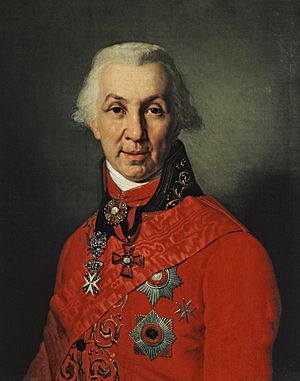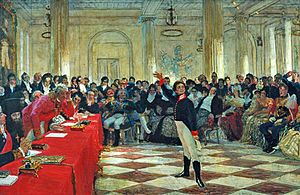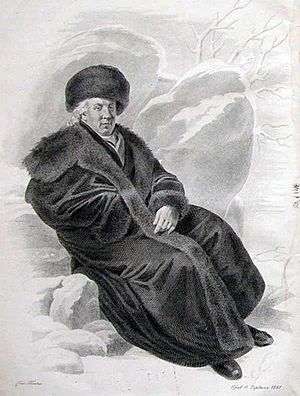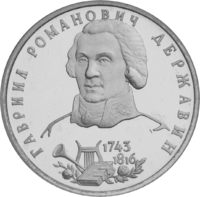Gavrila Derzhavin facts for kids
Quick facts for kids
Gavrila Romanovich Derzhavin
|
|
|---|---|

Gavrila Derzhavin by Vladimir Borovikovsky
|
|
| Born | Gavriil Romanovich Derzhavin 14 July 1743 Kazan Governorate, Russian Empire |
| Died | 20 July 1816 (aged 73) Zvanka manor, Novgorod Governorate, Russian Empire |
| Occupation | Poet, statesman |
| Period | Neoclassicism |
| Signature | |
Gavriil (Gavrila) Romanovich Derzhavin (Russian: Гаврии́л (Гаври́ла) Рома́нович Держа́вин; 14 July 1743 – 20 July 1816) was a very important Russian poet. He lived before Alexander Pushkin, who is also famous. Derzhavin was also a statesman, meaning he held important government jobs. His poems are usually seen as classicism, a style of art and literature. But his best poems also had strong contrasts and sounds, like the works of John Donne.
Contents
Biography
Early life and family
Gavrila Derzhavin was born in the Kazan Governorate in Russia. His family was part of the nobility, but they were not rich. His family's ancestor, named Bagrim, was from Tatar background in the 15th century. Bagrim became a Christian and served a Grand Prince named Vasily II of Moscow. For his service, Bagrim received land. Many noble families, including the Derzhavins, came from him.
One of Bagrim's descendants was nicknamed Derzhava, which means "orb" or "power" in Russian. This is where the Derzhavin family name came from. The family once owned a lot of land, but over time, it was divided or sold. By the time Gavrila's father, Roman Nikolayevich Derzhavin, was born in 1706, he had only a small amount of land and a few peasants working on it.
Roman Derzhavin joined the military. In 1742, he married Fyokla Andreyevna Gorina, who was also from a similar background. She also owned some scattered pieces of land. Gavrila Derzhavin was born almost nine months after his parents married. He considered Kazan his hometown, and the city is proud of this. However, he might have been born on one of his family's estates nearby. He was named Gavriil, which means Gabriel, because he was born close to a special day celebrating the Archangel Gabriel.
Education
As members of the nobility, the Derzhavins had to educate their children. But it was hard because they were poor, and there were not many schools in Russia back then. Noble boys were expected to work for the government or join the military when they turned 20. If they could not go to a school, they could study at home. But they had to take tests at ages 7, 12, and 16 to check their learning.
Gavrila's education started when he was 3 years old. Local churchmen taught him to read and write, as his mother could not read well. When he was 8, his family moved to Orenburg. A German man named Joseph Rose opened a school there. He taught children of noble families, mainly in the German language, which was important in Russia at that time.
When Gavrila was 10, his family moved back to their estates in Kazan. His father, who was sick, went to Moscow to retire from the military. He also planned to go to Saint Petersburg to sign up Gavrila for future military service. But his father ran out of money in Moscow and had to return to Kazan. His father died later that year. Gavrila inherited some land, but it did not bring in much money. Neighbors often tried to take their land. Gavrila's mother was a widow with no powerful relatives, so she struggled to get help from the courts. Derzhavin later wrote that his "mother's suffering from injustice remained eternally etched on his heart." Still, his mother managed to hire two teachers for her sons to learn geometry and arithmetic.
In 1758, a new school opened in Kazan. This saved his mother from sending him to Saint Petersburg. The school taught languages like Latin, French, and German, as well as math, dancing, and music. The teaching was not always great, and there were no textbooks. But students could perform plays by famous writers like Molière. Gavrila became very good at geometry. He was told he would join the engineers in Saint Petersburg. However, because of a mistake, he ended up becoming a private soldier in the Preobrazhensky Regiment, which guarded the royal family.
Career
In Saint Petersburg, Derzhavin started as a common soldier. He then rose to very high positions in the government under Catherine the Great. He first showed his skills during a big uprising called Pugachev's Rebellion. He was smart about politics and moved from military service to civil service. He became a governor in Olonets (1784) and Tambov (1785). He was also a personal secretary to the Empress (1791), the President of the College of Commerce (1794), and finally the Minister of Justice (1802).
He left his job in 1803. For the rest of his life, he mostly lived at his country home in Zvanka, near Velikiy Novgorod. There, he wrote poems. In his Saint Petersburg house, he held monthly meetings for a group called the Lovers of the Russian Word. Gavrila Derzhavin died in 1816. He was first buried in the Khutyn Monastery. Later, his remains were moved, but then reburied back at Khutyn.
Works
Derzhavin is best known for his odes. Odes are long poems, and his were often dedicated to the Empress or other important people. He did not always follow the usual rules for different types of poems. He would often mix serious, funny, or sad parts into an ode. For example, in a grand ode to the Empress, he wrote about looking for fleas in his wife's hair and compared his poetry to lemonade!
Unlike other poets of his time, Derzhavin loved to include small, specific details. He might mention the color of wallpaper in his bedroom or list what he ate for a meal. He believed that French was a language of harmony, but Russian was a language of conflict. Even though he liked pleasant-sounding words, sometimes he purposely made his poems sound harsh.
Some of Derzhavin's most important odes include "On the Death of Prince Meschersky" (1779), which was very well written. There was also the playful "Ode to Felica" (1782). His poem "God" (1785) was so powerful that it was translated into many European languages. "Waterfall" (1794) was written after the death of Prince Potemkin. And "Bullfinch" (1800) was a sad poem about the death of his friend Suvorov. He also wrote the words for Russia's first national anthem, Let the thunder of victory sound!
In 1800, Derzhavin wrote an important paper called Opinion. Emperor Paul I asked him to investigate why there was a famine in the Mogilev Governorate. In his Opinion, Derzhavin suggested that some people were taking advantage of peasants through land leases and alcohol sales. He also noted that local noblemen were not doing enough to help. To fix these problems, Derzhavin suggested new rules to limit the power of some noblemen. He also proposed changes to how the Jewish community was organized and suggested moving some Jewish people to new settlements near the Black Sea. His ideas influenced Emperor Alexander I, who later put some of Derzhavin's suggestions into law in 1804.
Influence
According to a writer named D.S. Mirsky, Derzhavin's poetry was incredibly rich and amazing. However, Mirsky also said that Derzhavin was not easy to learn from or copy. He did not necessarily make writing better for everyone, and his unique style was hard to follow. Still, some poets, like Nikolai Nekrasov, said they were inspired by Derzhavin more than by Pushkin. Derzhavin's style of using different rhythms in his poems was continued by Marina Tsvetaeva in the 20th century.
Tambov State University is named after Gavrila Derzhavin.
Memorable lines
- Gde stol byl yastv, tam grob stoit (English: Where used to be a table full of food, a coffin now stands)
- I'm a czar - I'm a slave - I'm a worm - I'm a god (Я - царь, я - раб, я - червь, я - бог)
- …Heart of a lion, wings of an eagle Are no longer with us! – How can we fight? (Львиного сердца, крыльев орлиных нет теперь с нами. Что воевать?)
Lines found at Derzhavin's table after his death

- The current of Time's river
- Will carry off all human deeds
- And sink into oblivion
- All peoples, kingdoms and their kings.
- And if there's something that remains
- Through sounds of horn and lyre,
- It too will disappear into the maw of time
- And not avoid the common pyre... <lines broken>
See also
 In Spanish: Gavrila Derzhavin para niños
In Spanish: Gavrila Derzhavin para niños



